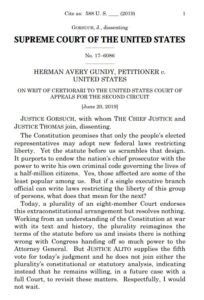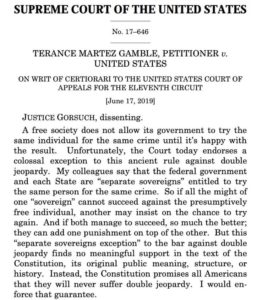A Fayette County, Pennsylvania woman whose use of a hair relaxer left her partially bald admitted that she hadn’t read the instructions, but said Optimum Salon Care Defy Breakage No-Lye Relaxer is in any case too dangerous to be allowed on the market. Judge Thomas Hardiman, writing for a Third Circuit panel, rejected her contentions that the product was defective or, in the alternative, that a reasonable consumer would not have heeded the label warning and directions for use. [Matt Miller, PennLive; Nicholas Malfitano, Penn Record; Chandler v. L’Oreal]
Archive for 2019
No more poor relation: SCOTUS accords Bill of Rights handling to takings claims
Yesterday’s Supreme Court decision along 5-4 ideological lines in Knick v. Township of Scott, on whether owners whose property is taken must first exhaust state remedies before seeking relief in federal court, is a big win for property owners. It overrules the unsound 1985 precedent to the contrary of a case called Williamson County Regional Planning Commission v. Hamilton Bank. It also represents the second time this term the Court has overruled one of its precedents, following Franchise Tax Board of California v. Hyatt, in which it overturned an earlier precedent on the scope of state tax power. The Court this term has declined to overturn precedent in a third case (Gamble v. U.S., on double jeopardy) and has yet to decide whether to overturn two notable administrative-law precedents in the still-pending case of Kisor v. Wilkie.
In some legal contexts, it can make sense to condition court relief on exhaustion of administrative remedies. But as Chief Justice Roberts wrote for yesterday’s majority, claims under the Bill of Rights are in general allowed direct access to federal courts. In creating an exception, Williamson had “relegate[d] the Takings Clause ‘to the status of a poor relation’ among the provisions of the Bill of Rights.”
Cato actively urged the property owner’s case in Knick, a case arising from a Pennsylvania law that imposed various uncompensated mandates, barbed by fines and penalties, on the owners of land on which persons are buried. Pennsylvania is known for its rural practice of “backyard burials.” Ilya Shapiro has one quick reaction and Ilya Somin, who has written extensively on Knick and the constitutional issues it raises, has another.
Great moments in slip and fall claims
The First Circuit has upheld a trial court’s dismissal on summary judgment of an outside worker’s suit against an auto dealership over a slip-fall injury he incurred on the floor in its garage and service area. The court noted that the reason for his presence at the dealership was that his company had been hired to clean it, and that he had said in his deposition that “typically there would be oil and grease everywhere” on that part of the floor after a day’s operations. Besides deeming the hazard to be open and obvious, the trial court had “noted Massachusetts precedent holding that a property owner does not owe a duty of care to a plaintiff where ‘the danger presented to the plaintiff was one that he had been hired to cure.'” [LaPointe v. Silko Motor Sales, First Circuit]
Religious establishment and improper delegation at the Supreme Court
Yesterday’s biggest news from the Supreme Court was not its 7-2 upholding of the Bladensburg, Md. Peace Cross (American Legion et al. v. American Humanist Association et al.; earlier). That outcome could readily have been foreseen given the result in earlier cases: Justices Stephen Breyer and Elena Kagan, to say nothing of the five conservatives, are prepared to uphold “longstanding monuments, symbols, and practices” that may include religious content but do not impose any significant harms on those of other faiths or none. This World War I memorial qualifies.
Instead, the big news is the outcome in Gundy v. U.S. (earlier), a case over whether Congress can delegate to the Department of Justice the power to decide how severe the penalties will be in one application of the sex offender registration law. While the critique of excessive delegation did not carry the day this time (the vote was 4-3-1 with Justice Brett Kavanaugh not participating), Justice Samuel Alito indicated that he would be inclined to look at the issue in a future case, and Kavanaugh is thought (from his D.C. Circuit jurisprudence) to be similarly minded. If so, then a future case could establish the important principle that Congress must spell out penalties and prohibitions in law itself, rather than punt such issues to executive agencies, at least in criminal matters and perhaps also in some regulatory ones. That’s huge, since the Court has rejected improper-delegation theories since the New Deal.

Justice Neil Gorsuch’s dissent in Gundy, together with his scalding dissent (earlier) in the double jeopardy/dual sovereignty case Gamble v. U.S. on Monday, makes him the libertarian hero of the week.

Lawyers shouldn’t secretly record medical exams
“Marquette, Mich. railway trackman sues his employer, alleging an on-the-job injury. Employer schedules an independent medical exam to assess his injuries. Trackman refuses to fill out medical questionnaire and refuses to answer examiner’s questions. Also, his lawyer tags along to the exam, which is … uncommon. And the lawyer secretly records the exam on his cell phone. District court: Given the ‘flagrant and repeated misconduct exhibited by Plaintiff and his attorney,’ the entire case is dismissed. Sixth Circuit: Affirmed. Although we’re generally reluctant to dismiss a plaintiff’s suit merely to sanction the plaintiff’s lawyer, both the trackman and his lawyer behaved badly here. Judge Sutton, concurring: Also, we shouldn’t be at all reluctant to hold parties accountable for their lawyers’ misdeeds, even if the parties themselves are not at fault.” [John K. Ross, Institute for Justice “Short Circuit” on Mager v. Wisconsin Central, Sixth Circuit]
How Charles Reich helped define the 1960s
If you’re looking for the enduring legacy of famed Yale law professor Charles Reich, I argue in a new Cato piece, it’s not so much to be found in his bestselling daydream of liberation The Greening of America as in his hugely influential work on government benefits as the “new property” of the administrative state. Excerpt:
Part of its ingenuity was in couching in seemingly sober and cautious terms an idea whose implications (especially welfare rights) were otherwise controversial, so as to appeal to moderates and also to the sorts of thinkers who would soon be termed libertarian. (The New York Times, in its obituary, says that “The New Property” article “defended an individual’s right to privacy and autonomy against government prerogative,” which sounds either Cato-ish or positively anodyne.) …
Reich’s remedies did not really operate to curtail big government, while they did advance the power and role within it of lawyers and those comfortable with legal process. In that way too, Reich outran his peers at capturing the spirit of his era.
Included: a discussion of the seeming, but in the end illusory, parallels between Reich’s early-1960s writing interests and those of economist Milton Friedman. More: anecdotes of Reich at Yale from Supreme Court Justice Sam Alito, via Josh Blackman. And a personal anecdote: classmates told me about this guy who’d roam the Old Campus engaging freshmen in long conversations, who was this famous author — but when he talked with my entryway-mates I happened not to be there, so I missed him.
June 19 roundup
- Gorsuch: “A free society does not allow its government to try the same individual for the same crime until it’s happy with the result.” And yet he and Ginsburg were the only dissenters from the Supreme Court’s 7-2 decision Monday in Gamble v. U.S. to allow consecutive state and federal prosecutions over the same conduct, the so-called dual sovereignty exception to double jeopardy protection [Reuters, Ilya Shapiro, Cato brief (with ACLU and Constitutional Accountability Center) that had urged an end to the exception; and a conspiracy theory about Kavanaugh that wound up having absolutely no predictive value]
- “When Should Plaintiffs Be Able to Sue Anonymously?” [Eugene Volokh]
- 77-year-old antitrust consent decrees were designed for a music business that long since faded into history, DOJ’s decision to reconsider is welcome [Federalist Society podcast with Kristen Osenga and Mark Schultz, Osenga blog post]
- Clarence Darrow once boasted a cult following among American lawyers. His manipulative speech in the Leopold/Loeb case leaves you to wonder whether much will outlive the hype [Bryan Caplan]
- Federal aid-to-state programs have exploded in recent years, a good way to redistribute money and power into the hands of political elites with little taxpayer or voter accountability [Chris Edwards, Cato, new study and blog post]
- Dear Caterpillar: do you think there is much likelihood of consumer confusion about whether this coffee shop t-shirt is promoting earth-moving machinery? [Timothy Geigner, TechDirt]
After a mechanic took it on an unauthorized ride, Chicago impounded her car. And then….
Her car was in the shop for work when a mechanic drove it on an expired license. What the city of Chicago did to her then shouldn’t happen to anyone [Elliott Ramos, WBEZ/ProPublica, Institute for Justice on its suit representing Veronica Walker-Davis and Jerome Davis, earlier]
An especially outrageous angle from an earlier Ramos/WBEZ story, quoted in our earlier coverage: “Chicago has impounded and sold off nearly 50,000 cars for unpaid tickets since 2011. Not a dime of the sales went toward the ticket debt; instead, the city and its towing contractor pocketed millions.”
The folly of interest rate caps, cont’d
“A new proposal would likely sharply curtail the issuance of credit cards and the extension of unsubsidized credit to lower-income people.” Diego Zuluaga comments for the Cato Daily Podcast with Caleb Brown.
More: David Henderson, Peter Suderman, Todd Zywicki and Federalist Society podcast with Zywicki and Wayne Abernathy, and Alex Tabarrok and Tyler Cowen with pointers to papers. As we noted in February, a recent study of Arkansas’s constitutional 17% cap found it hurt borrowers of modest means, who now drive to other states to take out small loans.
A second podcast with Cato’s Todd Zywicki, this one noting that earlier rounds of regulation precipitated the withdrawal of banking services from many less well-off communities to which postal banking is now being touted as a solution:
Discrimination law roundup
- Can a law ban calls to police by the public that are based on stereotyping or bias? Grand Rapids may find out [Scott Greenfield]
- Courts and EEOC have held that the federal ban on pregnancy discrimination encompasses a ban on discrimination related to abortion [Jon Hyman] Legislative proposal in Ohio, fortunately given little chance of passage, would make anti-vaxxers a protected group under state employment discrimination law [same]
- “Finally Some Robust Research Into Whether ‘Diversity Training’ Actually Works – Unfortunately It’s Not Very Promising” [Jesse Singal, British Psychological Society Research Digest, earlier]
- New EEOC employer reporting requirements represent “an order of magnitude increase in the amount of information the government wants” for one recreation management business [Coyote] How are federal agencies doing on civil rights issues in this administration? Federalist Society panel with Gail Heriot, Kenneth Marcus, Theodore Shaw, Timothy Taylor, moderated by Erik Jaffe;
- When an outcry arose over its partnership decisions, “Paul, Weiss did what every other mainstream institution does today when accused of racial bias: it fell on its sword.” [Heather Mac Donald, City Journal via Eugene Volokh]
- “Targeted Advertising and Age Discrimination: An Explainer” [Joe Ruckert, On Labor]
